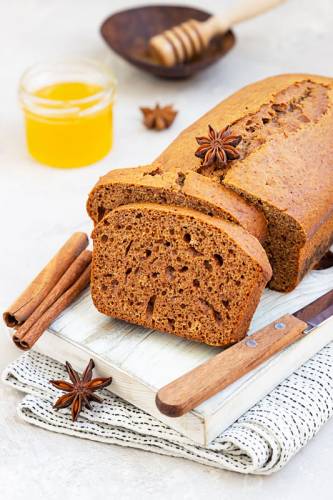First Week of Advent
An Act of Faith
Download Devotional Bahasa Indonesia Mandarin Chinese (普通話)
The Sacrament of Christmas
By Howard Thurman
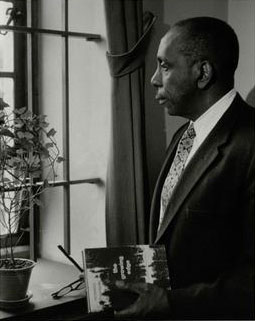
Howard Thurman From the Howard Thurman and Sue Bailey Thurman Collections, Howard Gotlieb Archival Research Center at Boston University
I make an act of faith toward all humankind,
Where doubts would linger and suspicions brood.
I make an act of joy toward all sad hearts,
Where laughter pales and tears abound.
I make an act of strength toward feeble things,
Where life grows dim and death draws near.
I make an act of trust toward all life,
Where fears preside and distrusts keep watch.
I make an act of love toward friend and foe,
Where trust is weak and hate burns bright.
I make a deed to God of all my days —
And look out on life with quiet eyes.
Reflect
As Advent begins, consider the acts of faith God is asking you to show the world. How can your act of faith dispel doubts and put an end to divisiveness that seems to be abundant these days?
Pray
Gracious God, just as the disciples asked for their faith to increase, we too come to you at the start of this holy season asking for more faith. You know where our faith wavers. Come to us, now, so that we can be bold in our witness and ease the unrest of a distrustful world. In Jesus’ name, we pray. Amen.
Amish Friendship Bread
We begin the Advent “House of Bread” journey with a recipe for Amish Friendship Bread. It is called “friendship” bread and it has been described as the “chain letter” of bread making because it uses a sourdough starter that is made in advance and shared with friends to make their own bread.
You can begin this bread at the start of Advent, allowing the time needed for the sourdough starter. When the starter mix is ready, share it with others and make loaves for gift giving. To get started, go to: friendshipbreadkitchen.com/amish-friendship-bread
So that you have a loaf of bread ready for the first Sunday of Advent, either make your favorite quick loaf recipe, buy a loaf at the store or get a boxed mix to whip up. (No judgment here.) As the weeks of Advent continue, remember: A new recipe will be posted each Friday, allowing you time to bake on Saturday and have bread for a Sunday meal around the Advent wreath.
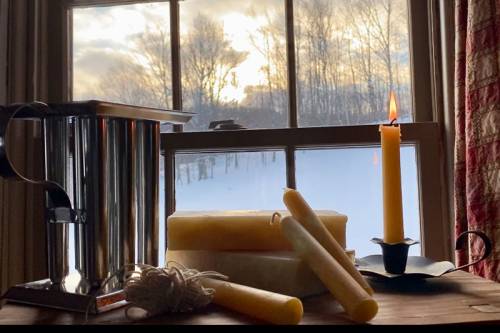 Day 1 | First Sunday of Advent, Nov. 28
Day 1 | First Sunday of Advent, Nov. 28
The four-candle room charge
The days are surely coming, says the Lord, when I will fulfill the promise I made to the house of Israel and the house of Judah. In those days and at that time I will cause a righteous Branch to spring up for David; and he shall execute justice and righteousness in the land. In those days Judah will be saved and Jerusalem will live in safety. And this is the name by which it will be called: “The Lord is our righteousness.” — Jeremiah 33:14–16
I began settling into what would be my home for the next three days — a clapboard-sided and wood-shingled roof structure from the 1700s that once served as a tavern for hungry and tired travelers. After putting my quilt on top of the straw mattress in one of the tiny bedrooms on the second floor, I took from my bag four candles. The candles were my payment for choosing to sleep in the tavern rather than a nearby motel during the open-hearth cooking class I signed up for.
Down the narrow stairs and into the kitchen I went. A fire was already blazing in the massive hearth. The cooking instructor was kneeling in front of a skillet that was placed over hot coals. I peeked over his shoulder and noticed golden biscuits that made my mouth water. “Biscuits made in a skillet?” I asked. “I had no idea you could do that.” He chuckled and looked up. Noticing the candles in my hand, he nodded to a wooden box in the corner. “You can put them there,” he said. I made my way to the box and opened the lid. Inside were hundreds of candles: some with wicks untouched and some burned down to an inch. I placed my candles as if placing money in an offering plate — with reverence and a sense that they would now be part of something bigger.
I sat by the fire, took a biscuit and asked about the curious four-candle room charge. Legend has it that a woman found her retreat into a world without modern-day conveniences so healing that she wanted to thank the founder of this living-history campus. What could she give to show what her stay meant to her? That’s when she thought of four candles. She sent the candles with a note that explained they represented the ones she would light during Advent: hope, peace, joy and love.
“She experienced the real meaning of Advent here in this old tavern,” the instructor said, not taking his eyes off the second batch of biscuits that he had begun. “Watching the fire to make sure it never went out, waiting for bread to be done, lighting candles to chase away the darkness and gathering with others around the hearth. She said it was Advent being lived out.”
I turned to the box of candles. Have I really “lived” Advent? I broke my biscuit like it was some holy communion wafer and ate silently, pondering.
Truly the days are coming when God’s promises will be fulfilled. Till then, we live Advent: lighting candles of hope, speaking words of peace, sharing the bread of joy and feasting on the abundance of love we will find in that lowly manger bed.
Pray
God of Advent waiting, we empty ourselves of all that keeps us from experiencing the hope, the peace, the joy and love you have for us. We offer you our complete attention. And so, come Emmanuel, come and help us to live in the Advent moment. In Jesus’ name, we pray. Amen.
Go deeper
Challenge yourself to create a space where there is no humming of electricity, dinging of social media notifications or the glow of computer screens. Dare to say no to Zoom meetings or decline signing up for another webinar. Find the divine quiet that can heal. Light the first candle of Advent — the candle of hope — and take some bread, break it, hold it in your hands and think of ways you can offer hope to this crazy, noisy world.
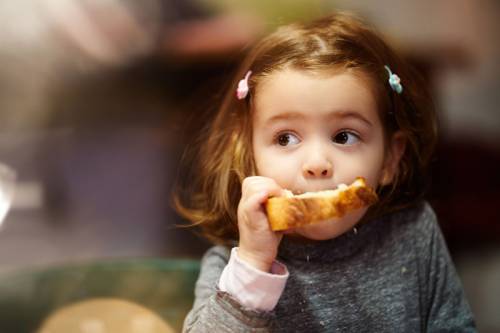 Day 2 | Monday, Nov. 29
Day 2 | Monday, Nov. 29
Sleeping with bread
Comfort, O comfort my people, says your God. … He will feed his flock like a shepherd; he will gather the lambs in his arms, and carry them in his bosom, and gently lead the mother sheep. — Isaiah 40:1, 11
I looked at the straggly Advent wreath that was failing to cheer up my tiny Manhattan apartment and sighed. It wasn’t like the lush evergreen wreaths I remembered my dad making when I was a child. While not pretty to look at, the wreath was perfect as it mirrored how I felt: straggly and sad. I found it ironic lighting the wreath’s first candle, which symbolized “hope.” Could I find hope amid all this quiet and lonely gloom? Every time I had dared to hope in something or someone, those hopes were dashed.
As the lone candle flickered, a gentle knock came to my door. I found no one on the other side. All that was there was a loaf of bread tied with a ribbon sitting on my welcome mat. A note from the elderly neighbor who had left it read: “Something to fill your stomach. Something to fill your heart.”
I went back inside, sliced a piece of the bread and sat back down in front of my Advent wreath. As I chewed on the bread’s yeasty goodness, I remembered a book I had read called “Sleeping with Bread: Holding What Gives You Life.” It is the story about how orphans, rescued from concentration camps at the end of World War II, were taken to England to be placed with families. The workers caring for the children noticed how many couldn’t sleep. They were afraid and anxious. So, each night the children were given a slice of bread to hold as they were tucked into bed. The workers discovered that the children slept better with bread in their hands. It eased their fears.
I took another slice of bread and held as if I was entering into a sacred moment. In a way, I was. For as I held the bread, I allowed myself to enter the despair those children must have felt, and ultimately, the hope that was renewed. I understood how in the holding of the bread, they were comforted. They finally felt safe, seen and loved.
Howard Thurman wrote that if we listen in the stillness of the quiet, “we can hear the whisper of the heart giving strength to weakness, courage to fear and hope to despair.”
In seasons of straggly, sad Advent wreaths, listen carefully to the whispers of the heart. Hear them tell you that you are safe, you are seen and you are loved. Advent has begun. Hope can never be dashed. Hold tightly to the babe of Bethlehem who is coming into this world — again.
Pray
Caring God, you know the fears and the hurts that keep us awake at night. Help us to remember that you do see, hear and love us. We know this to be true because you sent your Son, Jesus, to the world as an answer to our aches and longings. May we grab hold of your hand this day and be comforted by your presence. In Jesus’ name, we pray. Amen.
Go deeper
Before going to bed tonight, reach for a slice of bread to sleep with. I’m not suggesting a real slice — unless you feel so moved to do that. Rather let this “slice” be a list of what you are grateful for. Naming all the “God goodness” that is still in the world will comfort you — and help you sleep more soundly.
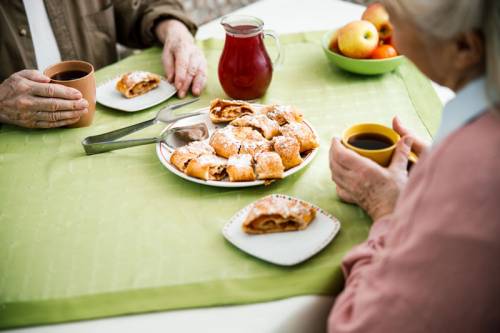 Day 3 | Tuesday, Nov. 30
Day 3 | Tuesday, Nov. 30
One who comes with bread
Steadfast love and faithfulness will meet; righteousness and peace will kiss each other. Faithfulness will spring up from the ground, and righteousness will look down from the sky. The Lord will give what is good, and our land will yield its increase. Righteousness will go before him and will make a path for his steps. — Psalm 85:10–13
I had one thing to remember and one thing only: Pick up the basket of tea breads in the home economics room before meeting the rest of the members of my high school’s cooking club on the bus. I was a freshman in a club of mainly cool juniors and excited about our trip to a nursing home where we were going to put on a short holiday skit, sing a few Christmas carols and then give out the treats we baked.
It wasn’t until we walked into the facility’s activity room that I realized I had forgotten the basket of tea breads was back at school. I felt horrible. The cool juniors rolled their eyes. Our home economics teacher tried to make me feel better and reassured me: “Everything will turn out wonderfully. Don’t fret.”
I did fret, though, and as we finished singing the last fa-la-las of “Deck the Halls,” I was anything but jolly. This was the part of the program where we were going to hand out the tea breads. Now we had nothing to give. All we could do was wish each resident a Merry Christmas. As I made my way to talk with the residents, I watched as my club members gathered in a safe group of their own off to the side of the room. Without something in their hands to give to the residents, many of the cool juniors were suddenly shy, not really knowing how to engage with the senior citizens.
I knelt beside one resident — a frail woman in a wheelchair. Her arthritic hands tremored slightly as she took mine that trembled slightly, too, not really knowing what to say. But something did come to me: a confession. Yes, before I knew it, I was confessing to her how it was my fault that she was not getting a tea bread. I expressed how sorry I was that I had nothing to give. That’s when her hand squeezed mine with surprising strength and told me the real gift was me being there by her side. “Bread is always nice to get,” she said, “but the real blessing is companionship.”
The psalmist tells us that “faithfulness shall spring up from the ground.” It sprang up that day, and I will never forget how the act of simply being there for someone is perhaps one of the greatest things we can ever do in this life. We all need a companion. The word “companion” is derived from two Latin words: “com”, which means “with,” and “panis,” which means “bread.” The word was originally used to describe someone you would share a meal with.
Howard Thurman said that we must all ask ourselves two questions. The first is “Where am I going?” and the second is “Who will go with me?” Whether we come with or without bread, there are many people who need a companion. They are the ones often forgotten during the holidays, hungering for company. Go to them — now — and after the holidays are over.
Pray
Faithful God, in our loneliest moments, we only need to turn to your beautiful words that you will never forget or forsake us. You walk with us. You guide us. You even carry us when we have no strength to go on. Thank you. In Jesus’ name, we pray. Amen.
Go deeper
Is there a friend you keep saying you will call? Has a loved one been reaching out to you, but you find you have no time to see them or talk to them? We say we will make time for others, but that time slips away. This Advent, put an end to slipping time. Take a loaf of bread, a tin of cookies or just the gift of yourself and visit someone. But remember to be mindful of COVID-19 precautions that are still needed to prevent spreading the virus. And if you feel inspired, try making this recipe for Cranberry Apricot Quick Bread: kingarthurbaking.com/recipes/cranberry-apricot-quick-bread-recipe
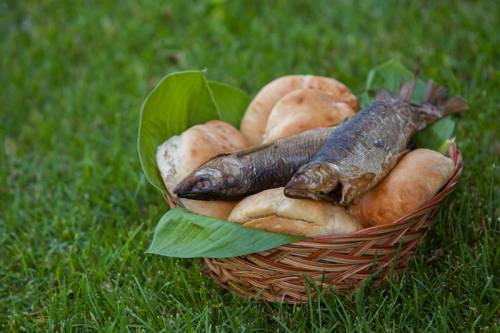 Day 4 | Wednesday, Dec. 1
Day 4 | Wednesday, Dec. 1
The bread song
When he looked up and saw a large crowd coming toward him, Jesus said to Philip, “Where are we to buy bread for these people to eat?” He said this to test him, for he himself knew what he was going to do. Philip answered him, “Six months’ wages would not buy enough bread for each of them to get a little.” One of his disciples, Andrew, Simon Peter’s brother, said to him, “There is a boy here who has five barley loaves and two fish. But what are they among so many people?” Jesus said, “Make the people sit down.” Now there was a great deal of grass in the place; so they sat down, about five thousand in all. Then Jesus took the loaves, and when he had given thanks, he distributed them to those who were seated; so also the fish, as much as they wanted. — John 6:5–11
There’s an old German proverb that goes, “Whose bread I eat, his song I sing.” The saying basically means whoever will feed your hungers in the world is the one whom you will follow. All throughout history, we have seen how true this is. We have seen people give up their beliefs and morals to fall in line with the one who is promising “bread” for the day.
Yet when I hear the miracle of how five barley loaves fed a crowd of 5,000, I can’t help thinking of that German proverb in a more positive light. I can’t help thinking of the beautiful song that others began singing about a generous, young boy because of his selfless act of giving what little he had. It’s a song that we all need to sing. It’s a song of no more hoarding. It’s a song that says belief in the common good still exists.
Last summer, “The Atlantic” magazine had an article that questioned whether people still believe in the common good. The reporter talked about how in a world of a deadly, ongoing and wearisome pandemic, divisions were growing stronger between the vaxxers and anti-vaxxers and between the masked and nonmasked. How did society get to the place of only caring for oneself without any thought of others? What happened to the common good?
We are in a season of Advent, which invites us to prayerfully make our way to the Christ child, reaching out to others along the way as we journey. Yet, too often, the focus on helping others gets overlooked because we find ourselves fearfully safeguarding what we own and what we think we are entitled to. The song we tend to sing is that of a broken world — “What’s in It for Me?” is the name of that song, I think — rather than the song of generosity that can bring hope and healing to many. We will never know how God will turn our smallest acts of generosity into big miracles unless we are willing to participate in the miracle like that young boy with five measly barley loaves did. What would be your bread song that others will sing?
Pray
God of many miracles and abundant grace, create in us a selfless heart, seeking to live in a way where everything we do and say, is done with forethought of how it will either hurt or help the world you have created. In Jesus’ name, we pray. Amen.
Go deeper
Take a good look at what is happening in your community. Where are there discrepancies between the haves and the have-nots? Investigate what is happening in terms of policies in the schools, in local government and town councils. This Advent, how can you do something for the greater good of where you live?
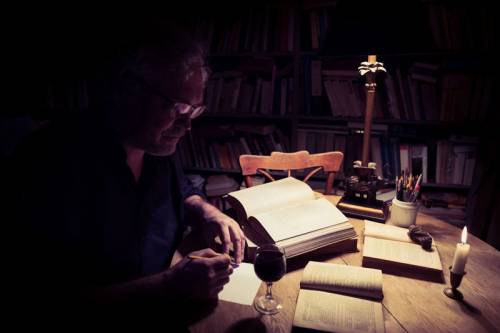 Day 5 | Thursday, Dec. 2
Day 5 | Thursday, Dec. 2
Alertly resting
For God alone my soul waits in silence, for my hope is from him. He alone is my rock and my salvation, my fortress; I shall not be shaken. On God rests my deliverance and my honor; my mighty rock, my refuge is in God. Trust in him at all times, O people; pour out your heart before him; God is a refuge for us. — Psalm 62:5–8
The sun had set on the first day of my open-hearth cooking class. It was a long and tiring day. I didn’t realize how much time and energy it took just to have one’s daily bread. As the last dish was washed in a tin bucket filled with the ever boiling cauldron of water hanging from an iron rod in the hearth, I could hear footsteps above me as others were getting ready to turn in for the night.
I wasn’t ready to go to bed, so after I threw the dishwater out the back door, I sat down for a moment on the ragged stone step. All I could hear were the beautiful sounds of God’s Creation: wind rustling in trees, the creek gurgling, the occasional hoot of an owl and the eerie, lonesome howl of a coyote.
There was also another beautiful sound that is often not heard anymore. Voices of people talking to one another around a table. It was then I made a promise to myself that when I reentered modern life I was going to do my best to have stillness be part of my nightly routine rather than the chaos of checking emails and social media. I would end my day talking more to my husband and talking more to God.
For some people, the world came to a crashing end back in October — OK, I am being dramatic. But on Oct. 4, the day Facebook and Instagram didn’t work for many hours, friends who depended on the constant connection freaked out. How will people know what I am doing? How will I know what my friends are doing? And those relying on digital technology for time-zapping webinars were left without an audience.
I admit, I wasn’t happy at first when Facebook wasn’t working. But that unhappiness reminded me that I had made a vow, which I had broken, to step away from the social media craziness. That night, without the ability to post and scroll, I found myself once again enveloped by the stillness that spoke to my soul. I found that I was calmer. I was happier. I didn’t have the negativity of the rumors and rants that consume social media affecting my mood.
Advent is a time when we need to willingly enter the holy silences so that we can hear more clearly God’s voice speaking to us.
In his book, “Deep is the Hunger,” Howard Thurman writes about the power of silence. He says: “I abandon all that I think I am, all that I hope to be, all that I believe I possess. I let go of the past, I withdraw my grasping hand from the future. In the great silence of this moment, I alertly rest my soul.”
“Alertly rest.” It seems like an oxymoron, but I can’t think of a more appropriate way to describe Advent. It is a time where we all must alertly rest. And we should not wait to do that until Facebook fails us again.
Pray
God, our souls are waiting for you this season. We want your holy stillness to surround us. But it is so hard to find the silence we need to be renewed. Help us to turn off the chatter in this world. Help us to find the strength to step away from negative news and conversations. Let us be able to hear the beauty of you talking to us in the sounds of your Creation. In Jesus’ name, we pray. Amen.
Go deeper
Create a daily practice, either in the morning or evening, to turn off all devices (phones, tablets, computers, radios and TVs) and sit in stillness. If complete stillness is hard to find, then buy meditative music that echoes the sounds of nature to play in the background.
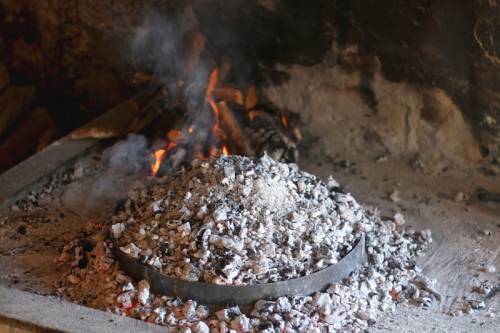 Day 6 | Friday, Dec. 3
Day 6 | Friday, Dec. 3
Beauty out of ashes
The spirit of the Lord God is upon me, because the Lord has anointed me; he has sent me to bring good news to the oppressed, to bind up the brokenhearted, to proclaim liberty to the captives, and release to the prisoners; to proclaim the year of the Lord’s favor, and the day of vengeance of our God; to comfort all who mourn; to provide for those who mourn in Zion — to give them a garland instead of ashes, the oil of gladness instead of mourning, the mantle of praise instead of a faint spirit. They will be called oaks of righteousness, the planting of the Lord, to display his glory. — Isaiah 61:1–3
Something struck me as I skimmed over the recipes the instructor handed to the participants of the open-hearth cooking class: There was no yeast, baking soda or baking powder in any of the recipes. I raised my hand and asked, “How will the bread we make be light and fluffy?” I soon learned that 18th-century cooking didn’t have many of the leavening agents used in the modern kitchen. Rather there was something they called “potash.” And as you can guess where this is going, yes, there is “ash” in that word.
Ashes from burned elms, beech and maple trees were gathered and mixed with water to use as a leavening agent. The potash was then burned at a high temperature, resulting in a white ash sometimes called “pearl ash.” When mixed with milk, honey or molasses, the pearl ash would bubble and cause quick breads to rise. It was a technique Native Americans used to leaven their breads, and they shared their knowledge with the white immigrants to their lands.
So, there I was that afternoon doing something I never thought I would ever do — make gingerbread with the ash of burnt wood. I was skeptical and kept asking the question, “Would the gingerbread taste like burnt wood?” Turns out, the pearl ash didn’t leave a sooty aftertaste, and the gingerbread we took out of the bread oven and enjoyed that night was light and moist.
Who would have thought something sweet could come from ash? God can. God can take messes left behind from all the metaphorical fires we have set — those arguments, rumors, assumptions and hurtful words — and redeem them. God can take the ash in our lives and turn it into something beautiful because God is a God of new beginnings and redemption.
During Advent, the prophet Isaiah prophetically speaks of the One who will come to save us — the Messiah — and all he will do: bring good news to the oppressed, bind up the brokenhearted, comfort all who mourn and give garlands in place of ashes.
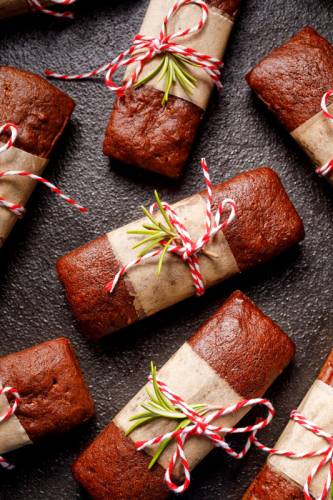 In my kitchen cupboard, I now have a jar of pearl ash that I found at a company specializing in 18th-century cooking utensils and supplies. I will use it to make my holiday gingerbread, and as I measure and mix, I will think of all the times God has made something beautiful from the ashes in my life.
In my kitchen cupboard, I now have a jar of pearl ash that I found at a company specializing in 18th-century cooking utensils and supplies. I will use it to make my holiday gingerbread, and as I measure and mix, I will think of all the times God has made something beautiful from the ashes in my life.
Pray
Redeeming God, our hearts thank you for the many times you have brought us out of trials, through suffering and restored our brokenness. You do make beautiful things out of our messes. In Jesus’ name, we pray. Amen.
Gingerbread
Let us get ready for the second Sunday of Advent, by making some delicious gingerbread. The bread is perfect for this time of year with the warm fragrance of holiday spices. Don’t worry, you won’t have to use ash from a fireplace in this recipe. Traditional baking soda will do. And remember to make extra to give to someone who is alone, grieving or struggling with depression. Go to: kingarthurbaking.com/recipes/gingerbread-recipe
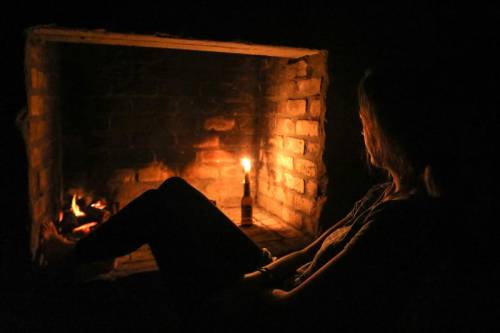 Day 7 | Saturday, Dec. 4
Day 7 | Saturday, Dec. 4
Needing one another
Then the Lord God said, “It is not good that the man should be alone; I will make him a helper as his partner.” — Genesis 2:18
There she was kneeling in front of the huge hearth puffing on a little spark that refused to be coaxed into a burning flame. She fanned her hands to encourage the spark. Nothing. She rearranged the kindling and twigs in hopes that would do the trick and get the fire going. Nothing. The spark was gone.
I watched her from the doorway of the “buttery” — a tiny pantry-like room that would have housed dishes, pots, bottles of ale and sometimes, not always, crocks of butter. I was on my way to get out the mugs for the coffee that I soon realized would not be coming anytime soon. We needed the fire that our cooking companion was trying to start to roast the beans, which would have to cool and then be ground before steeping them in a kettle of boiling water.
Before I could ask if there was anyone willing to make a coffee run to the nearest Dunkin’ Donuts, an elderly man hobbled into the room with an armful of wood. He stopped suddenly at the scene in front of him, realizing the logs were not needed now. What was needed was another pair of hands to help get the fire going. His old knees creaked as he knelt down next to the woman who was beyond frustrated. He took the flint rock and steel from her hands. We didn’t have matches as this was a true adventure of living in a different time.
Before he began striking the metal against the flint, another participant joined to help, telling him to wait as he took the time to rearrange the jute and twigs so that there would be more air flowing to feed the precarious spark. I remained standing in the buttery observing the trio. I had quickly learned that fire making was not one of my skills. I was good at hauling buckets of water from the creek and doing the dishes.
Finally, a spark turned into a flame, which turned into a blaze. There were cheers and smiles. Hands from other cooking participants reached out to help those fire makers up from the floor. I came out with the mugs and placed them on the table. Coffee beans were poured into a shallow plan to roast. It took a few hours, but finally we had our morning coffee at noon. And it never tasted so good.
I learned that day that I cannot do all things, nor am I expected to. Yet all too often we don’t admit when we can’t do something. All too often we hesitate to ask for help as if asking for help is a sign of weakness. Advent, though, is the perfect time to remember we were not meant to toil alone. We were created for community. God saw that at the very beginning in the Garden of Eden. God saw it later as well when Love came down to dwell — and help us in our weaknesses — at Christmas.
Howard Thurman concluded that living is itself an act of interdependence: “However strong we may be or think we are, we are constantly leaning on others. However self-sufficient we are, our strength is always being supplied by others unknown to us.”
Pray
Holy God, from the very beginning you knew that we could not walk this walk of faith alone. We need others to lean on. Forgive us when we become so self-reliant that we shut others out. Forgive us when we are afraid to admit when we need help. Turn our eyes to see the helpers in our lives. In Jesus’ name, we pray. Amen.
Go deeper
Take an honest assessment of yourself, identifying your weaknesses and then be bold and reach out for help. After you have identified where you are weak, take stock of the strengths you have that could help others in your community.

